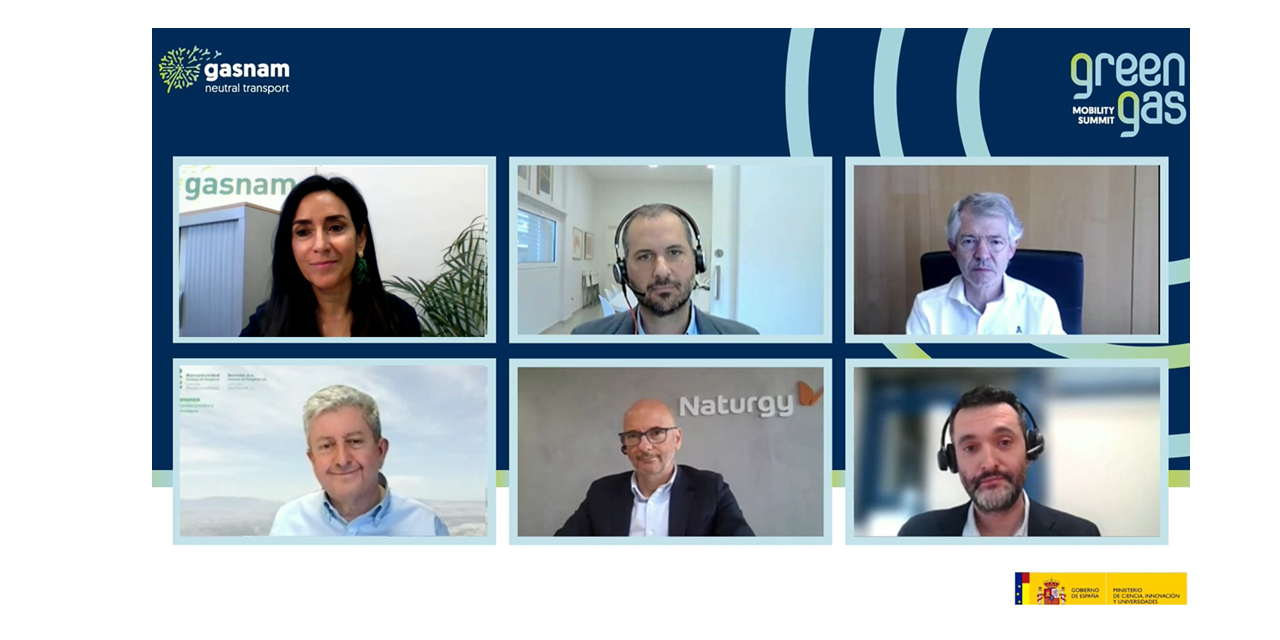Biomethane is the solution that allows to decarbonize heavy transport fleets immediately. This is one of the main conclusions of the webinar organized by Gasnam-Neutral Transport in which the Zaragoza Area Transport Consortium, EMT Madrid, the Commonwealth of the Pamplona Region, Naturgy and HAVI Spain shared their experiences and agreed that the high biomethane production potential of Spain (163 TWh/year equivalent to 45% of the national demand for natural gas), the existence of a network of stations and the offer of vehicles make this renewable fuel a real and cost-effective way to decarbonize heavy transport.
The webinar also highlighted the importance of the recent implementation of the issuance of Guarantees of Origin, a mechanism that guarantees the renewable origin of gas. “This is a milestone that will serve to promote the penetration of renewable gases in transport and that the fleet of more than 32,000 vehicles, mostly heavy-duty, that already circulate in our country becomes carbon neutral,” said the General Secretary of Gasnam Eugenia Sillero.
Seven years ago the Commonwealth of the Pamplona Region (MCP) launched a pilot project in order to purify the biogas from the Arazuri water treatment plant to convert it into biomethane and use it in three buses and two garbage trucks, which became the first heavy vehicles in Spain powered by renewable gas. Currently, the MCP has a fleet of 13 vehicles that, since 2022, run on biomethane with guarantees of origin. Its commitment to biomethane is so determined that, by 2035, the MCP wants to have a carbon-neutral fleet, of which more than 60% will run on the biomethane produced at its facilities.
Another success story is that of the Zaragoza Area Transport Consortium (CATZ), which carried out its first pilot test with biomethane in 2020, when it put a bus on the line that linked Villamayor de Gállego with Zaragoza into circulation. A year later, they opted for biomethane to move the two buses of the most used route in the area, which connects Zaragoza with Cuarte de Huerva, moves with 480,000 passengers a year and travels an average of almost 400 kilometers.
The biomethane generated from organic waste from the Valdemingómez Technology Park is the renewable fuel that moves the 20 buses on line C1 of EMT Madrid, a route that covers 1 million kilometers and transports 4.43 million passengers per year. The EMT, which has a fleet of more than 1,800 CNG buses, is committed to technological neutrality and sees in this success story a scalable business line and a present and future solution to decarbonize its fleet.
Freight transport also sees biomethane as an opportunity to minimize its emissions compared to traditional fuels. An example of this is HAVI Spain, which has a fleet of more than 50 trucks that runs on natural gas and is now refueling with biomethane at the filling station they have at their facilities in Esparraguera (Barcelona), allowing them to reduce CO2 emissions by more than 90% compared to diesel.
Naturgy, for its part, has two biomethane plants in operation and is completing the construction of a third that will come into operation this year. Likewise, the group has close to 60 projects in different stages of development in its portfolio, with a potential of more than 3.5 TWh/year (equivalent to the consumption of natural gas in Spain’s transport sector during 2022) and is also negotiating the purchase of biomethane for commercialization. Naturgy’s objective is to transfer the company’s leadership to the field of renewable gases and, therefore, its objective is to supply 100% of its gas sales for mobility with renewable gas.
Source: Gasnam







